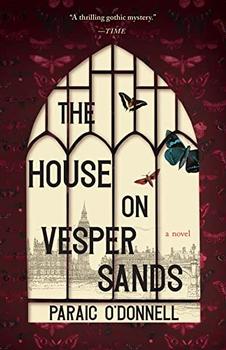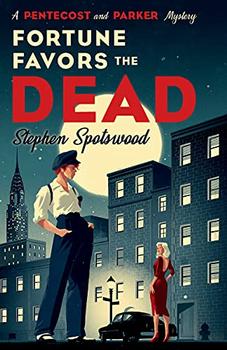Summary | Excerpt | Reviews | Beyond the book | Read-Alikes | Genres & Themes | Author Bio

A Simon Westow mystery
by Chris NicksonThe second book in the Simon Westow Mystery series, The Hocus Girl is set in 1822 Leeds, in the north of England, at a time when several cultural revolutions have everyone on edge. With industrialization on the rise, the Luddite rebellion, made up of workers who feared machines would take their jobs, has recently been quelled. England has just passed the Six Acts (intended to prevent disturbances by gagging newspapers and criminalizing any meetings calling for radical reform), and government officials are cracking down on suspected "rebels"—even spying on small gatherings and plundering circulating literature for evidence. Distrust permeates the city, leaving citizens to solve their own problems using means of questionable ethics.
The main characters are morally ambiguous people of their time. Simon Westow, his wife Rosie and their comrade Jane all work as thief-takers, a profession most closely compared to bounty hunters or private detectives today. Most frequently, they are hired by victims of theft to reclaim stolen property. (One such victim enlists the protagonist's help after being taken in by a "hocus girl"—a woman who drugs men and steals their belongings.) Simon spends most of his time traversing the streets of Leeds seeking out various people at local watering holes, bribing clerks and asking street magicians and printers to keep their ears open. Chris Nickson sets this scene well, describing the many shades of corruption in the city. As Simon walks around, he sees little girls stealing apples from a fruit stand while cops arrest a muddy street preacher ranting about Judgment Day. Rosie points out a rich woman who schemes to get discounts at shops, where the vendors in turn artificially raise prices to fool her into thinking she's getting good deals.
It is in this city of corruption and theft that Simon is called to help a truly kind and honest man. His longtime friend Davey Ashton has been arrested for sedition, and Davey's sister Emily pleads for Simon's help. Simon knows Davey to be a voracious reader with strong opinions about the government, but believes him incapable of any kind of conspiracy. Getting his friend out of prison is Simon's first priority, but he must continue with his usual work, which intersects with Davey's case in surprising ways.
My favorite part of the book was the contrast between Simon and his associate Jane. We don't know precisely why Simon became a thief-taker, but he clearly has a lot of loyalties. Not just to Davey, who took Simon in when he was a child, but also to his wife Rosie and their two boys. Jane, on the other hand, thrives on her anonymity, donning a shawl, hiding in shadows, and moving through the streets with her knife at the ready. While Simon copes by going home to his family, Jane frequently cuts herself as punishment for her mistakes or just to remember significant moments. It's compelling to see how the two approach the same work with differing philosophies. It becomes clear early on that Jane wouldn't hesitate to kill for a number of reasons, whereas Simon would do so only as a last resort of self-defense.
As Simon, Jane and Rosie seek to free Davey, they uncover more and more corruption. The deeper they get, the higher the stakes are raised, and people around them begin getting hurt. Meanwhile, small plot threads grow in importance; I found myself wondering how it would all come together. It's definitely a suspenseful read, especially since nobody knows how far the government's misdeeds extend. A pompous magistrate is foiling Simon's efforts, and he's even hired a menacing bodyguard. There's also a spy in town who may be reporting citizens to the government. Simon must get around these men in order to free Davey.
Because The Hocus Girl is so rooted in the street culture of the times, there are a lot of names to keep up with, and it's hard to remember if a character from chapters earlier is the kindly farrier or the corrupt clerk. I found it helpful to highlight names when I first encountered them so I could easily refer back; I had highlighted over 20 names by the book's end.
I have not read The Hanging Psalm, the first Simon Westow book, and I feel like The Hocus Girl works well as a standalone. I'm satisfied with how the loose ends were tied up, but I wanted to read more about how the events of the plot changed the characters. After getting to know them through these ordeals, I would've liked to see them move on afterwards, and there's only a glimmer of that. But perhaps my desire to watch these characters grow is a testament to the impression they've made on me and my curiosity about whether they'll transcend this gritty city that gives them life while always threatening to take it away. I look forward to learning more in the continuation of the series.
![]() This review was originally published in The BookBrowse Review in February 2020, and has been updated for the
January 2021 edition.
Click here to go to this issue.
This review was originally published in The BookBrowse Review in February 2020, and has been updated for the
January 2021 edition.
Click here to go to this issue.

If you liked The Hocus Girl, try these:

by Paraic O'Donnell
Published 2022
With all the wit of a Jane Austen novel, and a case as beguiling as any in Sherlock Holmes' casebook, Paraic O'Donnell introduces a detective duo for the ages, and slowly unlocks the secrets of a startling Victorian mystery.

by Stephen Spotswood
Published 2021
A wildly charming and fast-paced mystery written with all the panache of the hardboiled classics, Fortune Favors the Dead introduces Pentecost and Parker, an audacious new detective duo for the ages.
Your guide toexceptional books
BookBrowse seeks out and recommends the best in contemporary fiction and nonfiction—books that not only engage and entertain but also deepen our understanding of ourselves and the world around us.